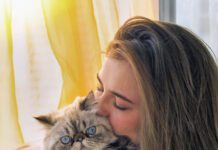Q. I recently took a three-year-old male domestic short-haired cat that has been living outside on my property to the veterinarian to get him fixed and whatever shots necessary. I was informed that he is feline leukemia negative, but he is infected with feline immunodeficiency virus (FIV). Is there anything I can do to make his life as good and long as possible? He seems fine most of the time, but he sometimes appears uncomfortable.
A. Thanks for getting in touch and for your obvious good care of this boy. I completely understand your concern, but let’s start with a brief review of FIV.
FIV is a retrovirus—meaning its genes are coded by ribonucleic acids (RNAs) rather than deoxyribonucleic acids (DNAs). It is endemic in domestic cat populations worldwide and transmitted primarily by bite wounds that may occur during conflicts between cats. This is why many outdoor cats, which are constantly vying for resources, resulting in aggressive interactions among them, become infected.
Once infected, a cat is infected for life and can serve as a source of infection for other susceptible cats. The virus does not remain infective for long outside of a cat’s body and is susceptible to virtually all environmental disinfectants.
FIV shares many properties with human immunodeficiency virus (HIV), although it is not transmissible to people or to any animal species other than cats. As their names imply, both HIV and FIV can cause immunodeficiency in infected individuals, making them prone to a variety of infectious diseases caused by other viruses, bacteria, and fungi.
FIV can also cause gingivostomatitis (inflammation of the gums/oral cavity), neurological disorders, and certain types of cancer. It’s important to note, though, that some FIV-infected cats will live as long as cats that are not infected and will never show signs of disease. For this and other reasons, cats should never be euthanized based solely upon a diagnosis of FIV infection.
FIV is diagnosed with a test called an enzyme-linked immunosorbent assay (ELISA), which looks for antibodies to the virus in the cat’s blood. It is important to point out that ELISA tests that are commonly used to measure FIV antibodies cannot reliably distinguish between those that occur as a result of the FIV infection and those that are induced by vaccination against FIV (this vaccine is no longer available in the U.S.). For this reason, knowing whether a cat was previously vaccinated against FIV is vital in interpreting the tests that are most commonly used to screen for FIV. Cases in which FIV is suspected based upon ELISA tests can be confirmed by a Western blot test, which demonstrates specific viral proteins in the blood.
If a cat does show clinical signs of infection, they’re most commonly from secondary infections and may include gingivostomatitis, chronic nasal discharge, lethargy, weight loss, and swelling of lymph nodes.
The management of cats infected with FIV involves proactive veterinary care, with regular checkups and aggressive therapy to address any health issues that arise. FIV-positive cats can be housed with FIV-negative cats as long as they are socially compatible. Aggressive interactions among FIV-positive cats and FIV-negative cats can result in the latter being infected with the virus, so any aggression should prompt separate housing for FIV-infected cats and those cats with which they do not get along.
There is no cure for FIV, but it’s important to reiterate that cats can live with this infection for a very long time with appropriate management. It’s also important to point out that FIV-positive cats that are allowed to roam outside freely serve as sources of infection for other cats, so cats that are diagnosed with this viral infection should not be allowed outdoors.
I hope this is helpful. You can find out more about FIV by visiting the Cornell Feline Health Center’s website at: https://www.vet.cornell.edu/departments-centers-and-institutes/cornell-feline-health-center/health-information/feline-health-topics/feline-immunodeficiency-virus
Best of luck, and please keep in touch.
All my best,
Elizabeth



